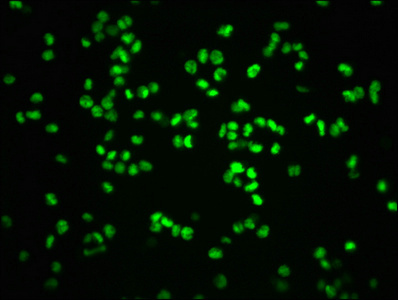
Immunofluorescence staining of K562 cells with CSB-RA019386A807phHU at 1:100,counter-stained with DAPI. The cells were fixed in 4% formaldehyde, permeabilized using 0.2% Triton X-100 and blocked in 10% normal Goat Serum. The cells were then incubated with the antibody overnight at 4°C. The secondary antibody was Alexa Fluor 488-congugated AffiniPure Goat Anti-Rabbit IgG (H+L).
Phospho-RB1 (S807) Recombinant Monoclonal Antibody
CSB-RA019386A807PHHU
ApplicationsImmunoFluorescence, ELISA
Product group Antibodies
ReactivityHuman
TargetRB1
Overview
- SupplierCusabio
- Product NamePhospho-RB1 (S807) Recombinant Monoclonal Antibody
- Delivery Days Customer20
- ApplicationsImmunoFluorescence, ELISA
- CertificationResearch Use Only
- ClonalityMonoclonal
- Clone ID1H3
- ConjugateUnconjugated
- Gene ID5925
- Target nameRB1
- Target descriptionRB transcriptional corepressor 1
- Target synonymsexon 17 tumor GOS561 substitution mutation causes premature stop; GOS563 exon 17 substitution mutation causes premature stop; OSRC; p105-Rb; p110-RB1; pp110; PPP1R130; pRb; prepro-retinoblastoma-associated protein; protein phosphatase 1, regulatory subunit 130; RB; retinoblastoma 1; retinoblastoma suspectibility protein; retinoblastoma-associated protein
- IsotypeIgG
- Protein IDP06400
- Protein NameRetinoblastoma-associated protein
- Scientific DescriptionKey regulator of entry into cell division that acts as a tumor suppressor. Promotes G0-G1 transition when phosphorylated by CDK3/cyclin-C. Acts as a transcription repressor of E2F1 target genes. The underphosphorylated, active form of RB1 interacts with E2F1 and represses its transcription activity, leading to cell cycle arrest. Directly involved in heterochromatin formation by maintaining overall chromatin structure and, in particular, that of constitutive heterochromatin by stabilizing histone methylation. Recruits and targets histone methyltransferases SUV39H1, KMT5B and KMT5C, leading to epigenetic transcriptional repression. Controls histone H4 Lys-20 trimethylation. Inhibits the intrinsic kinase activity of TAF1. Mediates transcriptional repression by SMARCA4/BRG1 by recruiting a histone deacetylase (HDAC) complex to the c-FOS promoter. In resting neurons, transcription of the c-FOS promoter is inhibited by BRG1-dependent recruitment of a phospho-RB1-HDAC1 repressor complex. Upon calcium influx, RB1 is dephosphorylated by calcineurin, which leads to release of the repressor complex (By similarity). In case of viral infections, interactions with SV40 large T antigen, HPV E7 protein or adenovirus E1A protein induce the disassembly of RB1-E2F1 complex thereby disrupting RB1s activity.
- ReactivityHuman
- Storage Instruction-20°C or -80°C
- UNSPSC12352203
